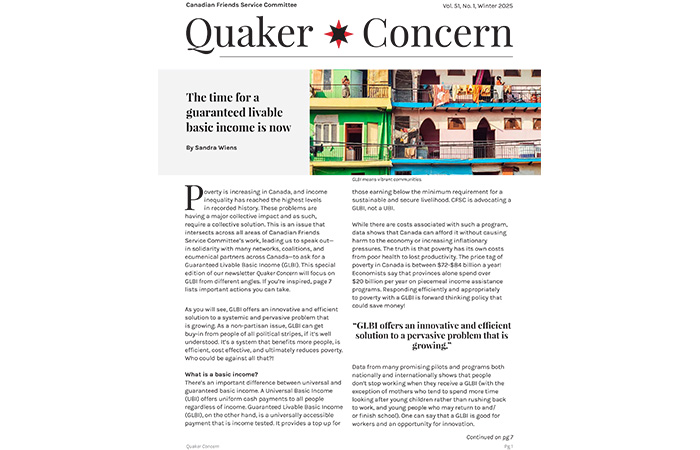
Open letter from Canadian churches on Ukraine
February 21, 2024
CFSC welcomes new Transformative Justice Program Coordinator, Karen Ridd
March 4, 2024![]() How do you feel about modern art? Do Jeff Koons’ balloon dog sculptures stir up an emotion in you? Maybe it’s nostalgia for your childhood, curiosity about what the artist is trying to say, or disdain for the rich collectors who pay tens of millions for this stuff.
How do you feel about modern art? Do Jeff Koons’ balloon dog sculptures stir up an emotion in you? Maybe it’s nostalgia for your childhood, curiosity about what the artist is trying to say, or disdain for the rich collectors who pay tens of millions for this stuff.
Koons has said of his work,
I believe in acceptance and the highest state, the highest realm that art can take you, is to acceptance of everything. [Calling my art] ‘kitsch’ is really a way of segregation, it’s a way of belittling something. It’s much better in life to be open to everything. People like to make some form of judgments in their life. It’s kind of a sense of grounding of themselves. But all these forms of judgment, of whether you accept something or don’t accept something, these externalized things really have to do with acceptance of self and of others.

Balloon Dog by Jeff Koons. Photo CC BY Ken Applebaum/Flickr
As I’ve pointed out previously, we hear abstract statements like these all the time. We hear them in relationships of all kinds. But in spite of being such a common way to communicate, they’re really tough to interpret.
One possibility is that Koons, while speaking broadly, is actually only talking about his own art without saying so. And he’s exaggerating for emotional impact.
We get this often from media pundits, politicians, and advertisers. We know that “the five best words in the English language” don’t have anything to do with McDonalds, even though a current ad campaign tells us they do. It’s no surprise that, lacking clarity, discussions on topics like modern art can be frustrating and polarizing.
Interpreting Koons generously, he raises some interesting ideas. He seems to say that art—even or especially if it doesn’t “make sense” to you—can help you to have new experiences, learn about other peoples’ worlds, and even have a less judgmental and more open experience of yourself. All of those are rich thoughts to reflect on.
Conflict mediators Jennifer Beer and Caroline Packard point out in their Mediator’s Handbook that: “Most positions are one-sided or premature solutions to a half-understood problem.” Perhaps, as Koons seems to say, being accepting of art can help to soften our naive sense that we understand every problem and have all the solutions.
Taking Koons’ statement as an attempt at literal truth, on the other hand, it obviously falls short. Counter examples are easy to think of. What about prejudiced art, is he saying that should simply be accepted? Is that actually “the highest state”—to have no taste or ethical grounding?
Isn’t judgment important for ethics?
The point isn’t specific to art. Consider an exchange between the popular YouTuber Sadhguru and emeritus professor of religion at Columbia University, Robert Thurman. Thurman presents the position that meditation alone won’t result in ethical action—learning about ethics and reflecting on it are also indispensible.
Sadhguru seems to downplay this need for reflection on ethics, saying, “The moment you speak about good and bad you divide the world… When we divide the world into good and bad, my side is good and your side is bad.”
Thurman responds that perhaps for certain spiritual figures like Sadhguru who transcend the world these distinctions aren’t there anymore. But ignoring them isn’t practical or useful advice for most of us: “For us ordinary people, love is good and hate is bad.”
This idea is important to reflect on for your own relationships. Accepting other people as they are sounds wonderful. But what about when their actions conflict with your needs, or even your ethics?
5 Conflict Strategies: The Thomas-Kilmann Instrument
One tool that’s helpful in thinking about your strategies in such relationship conflicts is the Thomas-Kilmann Instrument.
It compares two factors: assertiveness—how much you care about getting your way, and cooperativeness—how much you value the relationship.
When does your conflict strategy involve:
- Directing—caring more about getting your way than about the relationship, and therefore telling the other person what to do?
- Collaborating—valuing both the relationship and your own goals so much that you work together to find a way to change the situation so that everyone’s needs can be met?
- Compromise—finding an easy enough solution where everyone is somewhat satisfied, but no one gets just what they want?
- Avoidance—placing a low priority on both getting your way and on the relationship by trying to ignore or leave the situation?
- Accommodation—deciding that your goals are merely subjective or not that important and instead prioritizing the relationship and trying to please the other person?
In the world of conflicts and relationships, there is no one-size-fits-all path forward. None of these five strategies is “the right way” to engage. Each can be useful in some cases, and have serious drawbacks if pushed too far.
Psychologist John Welwood coined a term “spiritual bypassing” for clients who he said tried excessively to use spiritual ideas and practices to “transcend” pain and conflicts. This meant they denied problems in their relationships, belittled their own and others’ needs, didn’t deal with unresolved emotional issues, and otherwise sought to suppress experiences of the challenges of life.
This extreme accommodating or avoidant conflict style might be what happens if you hear the sorts of ideas Koons and Sadhguru present above and push them too far. This could result in damage to relationships and to yourself.
Among other problems, this approach seems not to respect the power of emotions. Where possible, research suggests that it will be more beneficial to be aware of your emotions, treating them with care and applying techniques like self-compassion (which appear to provide benefits even in situations of oppression and injustice). Once you know what you feel and are in a good space to talk about it, do your best to name problems in a constructive way.
A version of this post appeared on Psychology Today. Sign up for a free workshop series to improve your communication and conflict skills.




